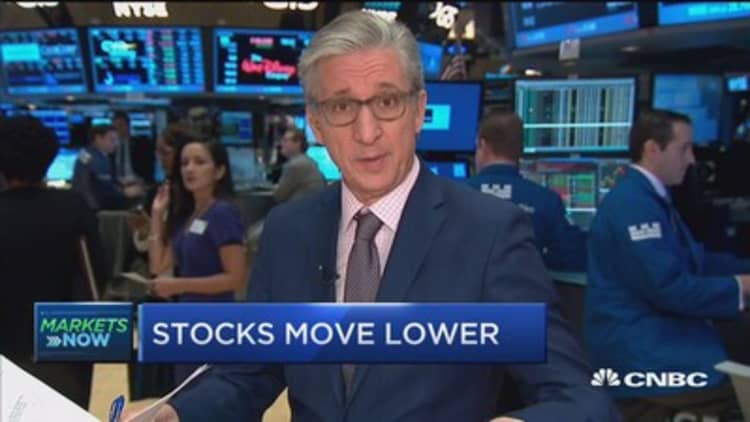
The first wave of fourth quarter earnings, including that of Morgan Stanley on Tuesday, have generally been above expectations.
But as we digest the results, it's worth noting that 2016 was not a banner year for earnings. earnings are projected to be up a measly 0.9 percent, according to Thomson Reuters.
Remember: The S&P 500 was up nearly 10 percent last year, so almost all of the gains came not because earnings were up but because the multiple expanded.
Much of the problem comes from the catastrophic 77 percent decline in energy earnings.
And the market is anticipating much of this will reverse in 2017. Right now, earnings are expected to rise 12 percent, but most analysts have not changed their 2017 estimates to reflect the Trump agenda. Many strategists believe 20 percent growth could be possible.
That's why the markets are like a tightly coiled spring: There is going to be a lot of pressure to perform big in 2017.
Here are the expectations for some of the bigger sectors, rounded off:
2017 earnings expectations
- Energy up 366%
- Materials up 15%
- Technology up 12%
- Financials up 12%
Source: Thomson Reuters
That's not a typo on energy: up 366 percent. Analysts have a 100 percent increase in earnings penciled in for ExxonMobil, the biggest energy name out there.
Is any of this remotely possible? Several well-known strategists told me it was.
I recently moderated the annual Philadelphia CFA dinner with Citigroup chief equity strategist Tobias Levkovich, as well as Richard Bernstein and AJO Partners' Ted Aronson. Bernstein is in the camp that earnings are going to expand for several reasons:
- The president-elect may not get everything he wants, but he won't come away empty handed. There WILL be a reduction in corporate taxes, and there will be some reduction in regulations and some kind of stimulus program.
- We are about to get a major stimulus program when there is no recession and the jobless rate is 4.5 percent. Bernstein said he couldn't remember if that has ever happened. Whatever the wisdom of this, it's going to have two likely effects: It will help earnings, and it will likely increase inflation.
- Something is changing: We are no longer in global deflation. There are improvements in many economies, including the U.K., Germany, even Japan. It's just that no one believes, at least not yet.
- The profit cycle is accelerating. That's why cyclicals and banks are accelerating, though Bernstein points out that this acceleration started early in 2016.
Levkovich also said earnings could be stronger than expected, particularly with a corporate tax reduction. He noted that corporations are currently paying a 27 percent effective tax rate. Assuming that stays the same, 2017 earnings for the S&P 500 could go from $118 in 2016 to $128. If the effective tax rate goes to 20 percent, earnings could get to $140, he said.
That would be an earnings boost of nearly 20 percent.
Bernstein is certainly right about one thing: Something does appear to be changing. This has important implications for investing in stocks versus bonds. Remember 2014-2016, when everyone was investing for yield, no one was investing for growth? Now the talk is about growth. What happened to our favorite slogans: "lower for longer?" and "the new normal?" Don't hear that as much any more.
Instead, Bernstein pointed out, the question if you're a bond bull is very simple: Will nominal growth in the U.S. be stronger or weaker a year from now?
If it will be stronger, Bernstein and others have argued, it's rational to believe that stocks will rally, and bonds will not.


